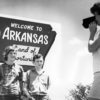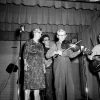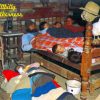calsfoundation@cals.org
Ozark English
A dialect called Ozark English is spoken in the Ozark Mountain region of northwestern Arkansas and southwestern Missouri. It is a close relative of the Scotch-Irish dialect spoken in the Appalachian Mountains, as many settlers migrated from Appalachia to Arkansas beginning in the late 1830s. Scholarship posits that the geographic location and subsequent isolation of the Ozark Mountains allowed for the preservation of select archaic properties of the dialect spoken by Appalachian settlers. This isolation fostered an independent development of the dialect that set Ozark English apart from what is widely considered standard American English. Like its Appalachian cousin, Ozark English is commonly linked to stereotypes that depict the mountain culture as backward and uneducated.
Scholars began linking Ozark English to older forms of English as early as the 1890s, noting similarities between Ozark speech and terms found in English literature from the medieval and Renaissance literary periods. More recent studies recognize the presence of earlier forms of English in Ozark speech but suggest that the parallels between the two were somewhat exaggerated by early scholars. In the twentieth century, researchers studied language in remote communities in the Ozarks, documenting various archaic words and usages. Charles Morrow Wilson, a Fayetteville (Washington County) native, and Vance Randolph, a seminal figure in Ozark folklore studies, were among the scholars studying Ozark English during this period.
Wilson spent time with residents of Hemmed-in-Holler (Newton County) during the Great Depression, where he found that the people could “swap talk and break bread with farmers of Chaucer’s England, and suffer few misunderstandings.” Wilson recorded that an Ozarker “tarries” to pass time and “carries a budget on his back,” just as Shakespeare’s characters did.
Randolph published several works on the Ozark dialect, many of which appeared in revised forms in Down in the Holler (1953), a collaboration with George P. Wilson. Down in the Holler examines various aspects of Ozark English, including its pronunciation, grammar, and vocabulary. Like Wilson, Randolph recorded instances in which Ozarker pronunciation reflected earlier English, such as heerd, deef, bile, strenth, chimley, and anyways. Randolph also documented unique Ozark colloquialisms such as the verbs noodle (to catch fish with bare hands) and auger (to look around surreptitiously or go about aimlessly), as well as usages considered taboo in Ozark English.
The strength of the Elizabethan influence varies throughout the region, but it appears to be more concentrated in remote areas such as those studied by Morrow and Randolph. The pair’s assessments are indicative of cultural-studies trends that romanticized the connection between the Ozark dialect and earlier forms of English during the early twentieth century.
In 1988, researchers Donna Christian, Walt Wolfram, and Nanjo Dube published a study of Ozark English as part of a larger project that sought to enhance existing linguistic studies through a comparison of Ozark English and Appalachian English. A fieldwork group led by Dube collected audio recordings of native speakers from rural areas in Crawford, Franklin, Johnson, Madison, and Newton counties. The effort examined the speech of fifty-nine residents from ages ten to seventy, documenting selected properties in Ozark English, including the completive done, a– prefixing, irregular verbs, and aspects of subject-verb agreement.
The team studied the completive done in various treatments (as in “I done told you”), concluding that it functions as a modal auxiliary; however, done appeared almost exclusively in the speech of those over fifty years of age. A– prefixing occurs in front of verbs, as seen here: “He just kept a-beggin’ and a-cryin’ and a-wantin’ to come out.” Again, researchers observed fewer instances of the quality in younger speakers. The decline of this usage by younger speakers suggests that the speech of younger Ozarkers may be moving away from the Ozark dialect and trending toward standard American English.
Ozark English was studied throughout the 1900s, but scholars largely relied on limited and anecdotal data. More recent scholarship such as that performed by Dube and her team does not dismiss the validity of these records. The goal is to assert the Elizabethan influences that exist in isolated communities within the region while acknowledging the changes that are occurring in the speech of younger Ozarkers. Ozark English—once nurtured by the region’s geographic location and its isolation from outside influence—has today become a fusion of the old and new, a unique dialect born of a people’s cultural history.
For additional information:
Brooks, Blevins. Hill Folks: A History of Arkansas Ozarkers and Their Image. Chapel Hill: University of North Carolina Press, 2002.
Christian, Donna, Walt Wolfram, and Nanjo Dube. Variation and Change in Geographically Isolated Communities: Appalachian English and Ozark English. Washington DC: Center for Applied Linguistics, 1988.
Randolph, Vance, and George P. Wilson. Down in the Holler; a Gallery of Ozark Folk Speech. Norman: University of Oklahoma, 1953.
Wilson, Charles Morrow. The Bodacious Ozarks: True Tales of the Backhills. New York: Hastings House, 1959.
Leslie Hassel
Fort Smith, Arkansas
 Arkansas's Image
Arkansas's Image Folklore and Folklife
Folklore and Folklife Hillbillies
Hillbillies Vance Randolph
Vance Randolph  Charles Morrow Wilson
Charles Morrow Wilson 




I am in San Diego, but my mom’s people are from Bourbon, MO. I spent about half my life in Missouri and the other half here. My cousin was down from San Jose recently and we were discussing words people would use in Missouri that you rarely hear other places. Like “yins”: “Grab yins a beer.”
So one thing that caught my attention while reading this little article is what the writer said about old Ozark speakers sounding like they are English. My great-aunt Lucille Adams died at 101. She lived in the family farmhouse that was built in 1854. I swear sometimes Lucille and several other old timers out there sounded like they were English when they talked.